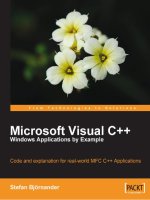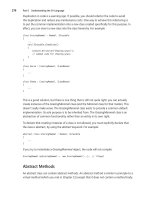Foreword - By Stanley B. Lippman, Former Architect, Visual C++
Bạn đang xem bản rút gọn của tài liệu. Xem và tải ngay bản đầy đủ của tài liệu tại đây (151.87 KB, 2 trang )
xv
Foreword
By Stanley B. Lippman,
Former Architect, Visual C++
A person standing on the side of a river shouts to someone on the opposite bank: “How
do you get to the other side?” The second person replies: “You are on the other side.”
—Chris Gosden
C
++/CLI is a binding of C++ to Microsoft’s .NET programming environment. It integrates ISO
C++ with the Unified Type System (UTS) of the Common Language Infrastructure (CLI). It supports
both source-level and binary interoperability between native and managed C++. As the Gosden
quote suggests, it is how one gets to the other side, regardless of where you happen to be standing.
The actual details of how you do this are covered in Gordon’s fine text.
In primitive societies and adolescent fantasy novels, such as The Lord of the Rings (which,
along with Remembrance of Things Past, is one of my favorite books), names have a kind of
magical aura to them—they need to be handled with extreme care and protected. The same
holds true in computer science, apparently—or at least within Microsoft. Although you hold in
your hand the first book devoted solely to C++/CLI, I couldn’t for the life of me find any specific
reference to C++/CLI in the Visual Studio 2005 release—at least not in the Visual C++ IDE, in
order to open a C++/CLI project, or in the “What’s New” section of the documentation. This
whole notion of binding C++ to .NET has a sort of fantasy aspect to it that has clung to it since
the original Managed Extensions to C++ in the Visual Studio .NET release of 2001. C++/CLI is the
noncompatible and more elegant replacement for the Managed Extensions. It is how we program
.NET using what the book’s subtitle calls “the Visual C++ Language for .NET.” That’s what
Gordon’s book will teach you how to do.
As Gordon states in his introduction, C++/CLI represents an evolution of C++. This does
not, of course, imply that C++/CLI is a better language than C++; rather, C++/CLI is better adapted
to the current and future computing environment that we work in. If you are a Visual C++
programmer with legacy “native applications” and need to move or extend these applications
to .NET, C++/CLI is an essential tool for your survival, and Gordon’s text is an essential first step
to mastering this tool.
Hogenson_705-2FRONT.fm Page xv Saturday, October 28, 2006 7:24 PM
xvi
■
CONTENTS
An aspect of evolution is an increase in structural complexity, and this, too, is reflected in
C++/CLI: knowing C++ may or may not be a help in understanding C++/CLI! For example,
there is no such thing as a destructor in .NET, so although the syntax resembles that of the
native C++ destructor, its behavior is oddly counterintuitive: you simply can’t fully understand its
operation by its analogous form. And this is where Gordon’s text becomes invaluable both as a tuto-
rial and a desktop reference. It is for this reason that I highly recommend it.
Hogenson_705-2FRONT.fm Page xvi Saturday, October 28, 2006 7:24 PM









